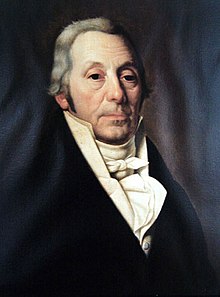Johann Caspar Engels

Johann Caspar Engels (born February 28, 1753 in Barmen (today a district of Wuppertal ); † July 20, 1821 there ) was a German manufacturer and wholesaler in the textile industry .
Life
His father was the eponymous Johann Caspar Engels (1715–1787). This was originally a yarn bleacher and ribbon knitter. In 1770 he became the founder of mechanical lace production in Unterbarmen . The mother was Anna Katharina (née Steinbach) (1720–1761). One brother was Benjamin Engels, who later became a partner in the family business.
Engels also joined the family business. In 1789 he married his first wife Johanna Konstantie geb. Korten (1761-1790). Just one year after her death, he married Luise (née Noot) (1761–1822). Their father came from a merchant family from Mülheim and Amsterdam and was, among other things, mayor of Ruhrort .
In addition to his father's company, Engels founded the Barmer Mineralbad in 1803. He also ran a brick factory on his estate. The manufactory inherited from the father employed 300 workers in 1808 despite the sales crisis caused by the continental blockade. Already started by his father, the workers were concentrated in a real factory colony in Engels-Bruch. In addition, Engels devoted himself to wholesale silk from Italy . In contrast to most of the other entrepreneurs in Wuppertal, Engels survived the economic crisis caused by the continental blockade and later by the import of cheap English factory goods with comparatively no problems.
Engels was one of the dignitaries in Barmen from an early age. In 1785 he was one of the founders of the "Gesellschaft Musica". His enthusiasm for music was also expressed in the fact that he let his children learn instruments and enjoyed playing the organ himself. In 1791 he became church master of the Elberfeld reformed community. In 1796, like his brother, Engels had a school built at his own expense. This served mainly to educate the children of his workers.
With the establishment of the Grand Duchy of Berg and the introduction of new administrative structures based on the French model in 1806, Engels became a leading member of the city council and was involved in numerous civic welfare institutions.
Engels was deeply rooted in Bergisch Pietism and maintained close relationships with leading theologians of the time. His daughter Louise (Luisa) Engels (* November 23, 1799; † February 25, 1845) married the pastor and later Prussian court preacher Karl Wilhelm Moritz Snethlage in 1822 . Since 1817 he has been involved in the Prussian Church Union . He was instrumental in founding the United Evangelical Church of Unterbarmen , which was completed in 1822 by separating from the Lutheran and Reformed congregations in Elberfeld. He and, after his death, his son Friedrich Engels donated significant sums of money for the construction of the Unterbarmer main church (built 1828–1832 instead of a provisional predecessor) .
literature
- Hermann Bollnow: Engels, Johann Caspar. In: New German Biography (NDB). Volume 4, Duncker & Humblot, Berlin 1959, ISBN 3-428-00185-0 , p. 527 f. ( Digitized version ).
- Michael Knieriem with a text by Hans Helmich. Spiritual letters to Johann Caspar Engels and his wife Louise, b. Noot, 1798-1821. At the same time, a contribution to Collenbuschianism in Wuppertal . Schmidt, Neustadt an der Aisch 1992 ( news from Engels-Haus issue 9)
- Michael Knieriem: Johann Caspar Engels II (1753-1821). In: Wolfhard Weber (Ed.) Bergisch-Märkische entrepreneurs of the early industrialization. (= Rheinisch-Westfälische Wirtschaftsbiographien , Volume 18.) Aschendorff, Münster 2004, pp. 66–84.
Web links
- Barmer Heads ( Memento from November 2, 2016 in the Internet Archive )
Individual evidence
- ↑ Peter Herkenrath: 140 Years of History of the United Evangelical Congregation Unterbarmen 1822–1962. Wuppertal 1962.
| personal data | |
|---|---|
| SURNAME | Engels, Johann Caspar |
| BRIEF DESCRIPTION | German textile entrepreneur |
| DATE OF BIRTH | February 28, 1753 |
| PLACE OF BIRTH | Barmen |
| DATE OF DEATH | July 20, 1821 |
| Place of death | Barmen |